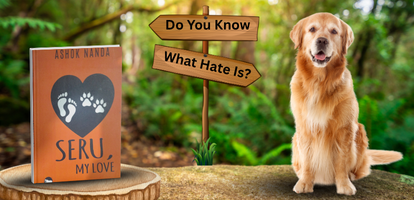


Sometimes, when I look into Seru’s eyes, I see a world untouched by hatred. Seru, with his wagging tail and unguarded heart, knows nothing of the darkness that humans have carried through the centuries. He lives in the moment, ready to play, eager to love, never holding a grudge. And yet, as I reflect on the stories we humans have written on the pages of history, I’m struck by the contrast between his innocence and our capacity for cruelty.
The conversations in Seru My Love do not shy away from the hardest truths. “Oho, the Germans were cultivated to hate the Jews. You know what they did? Female German soldiers forced Jews in concentration camps to brush their teeth with human excreta.” It’s a sentence that makes you pause, your breath catching at the horror of it. The Holocaust remains one of humanity’s darkest hours; a time when hate was not just tolerated, but systematically taught and enforced. Ordinary people, shaped by propaganda and fear, became instruments of unimaginable suffering. The details are almost too much to bear, but we must bear them, because forgetting is the first step toward repeating.
And then, as if to remind us that hate is not bound by time or place, another voice recalls, “You have no idea about what hate is? We had a big emperor in the east called Genghis Khan. He wanted friendship with the ruler Ala ad-Din Muhammad of erstwhile Turkey. But the ruler massacred the soldiers and poured molten silver into their eyes and mouth. Khan in return to take revenge led an army of 2,00,000 strong Mongols and killed one million soldiers and three million civilians. Not even cats and dogs were spared.” The numbers are staggering, but the real tragedy lies in the fact that hatred, once unleashed, knows no limits. It consumes not only armies and empires, but entire generations; leaving behind a legacy of pain that echoes through the ages.
As I sit with Seru, I wonder: how did we get here? How did we, the most intelligent species on earth, become so adept at teaching and carrying out hate? Seru, in his simple way, cannot comprehend such things. He doesn’t care about your religion, your history, or the grudges you carry. He greets every new face with the same open-hearted curiosity. He forgives, forgets, and moves on. If he’s ever known pain, he doesn’t pass it on.
We humans, on the other hand, have perfected the art of holding onto anger, of passing down resentment like a family heirloom. We build monuments to our victories and our vengeance, teaching each new generation who to fear, who to blame, who to hate. We invent reasons to divide ourselves—by race, by religion, by nation, by ideology. And when hate takes root, it grows wild, justifying the unthinkable.
But what if we chose differently? What if, like Seru, we met the world with curiosity instead of suspicion? What if we forgave more easily, loved more freely, and refused to let old wounds define our future?
The stories of the Holocaust and the Mongol invasions remind us of the depths to which hate can drag us. But Seru, in his quiet, everyday way, offers a different lesson. He reminds us that hate is not inevitable. It is taught, learned, and passed on—but so is kindness. So is love.
Maybe the path forward is simpler than we think. Maybe it starts with seeing each other not as enemies or strangers, but as fellow travelers. Maybe it’s about letting go of the stories that keep us apart, and writing new ones—stories of forgiveness, of understanding, of peace.
Seru doesn’t know what hate is. Maybe, if we listen closely, we can remember what it’s like to live that way too.